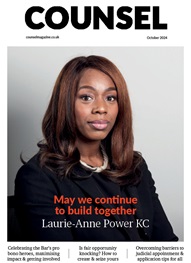*/
The Law Reform Committee essay competition 2012 was won by Jeremy Goldsmith with his essay “The Frustration of Genuine Wills’: Time for a Dispensing Power?”. Second place went to Sam Jacobs for his entry “Me and Mr Jones: Advocating Time Limits for Immigration Detention”. There were two highly commended prizes awarded to Yvonne Kramo for her entry “The Illusory Right to Liberty: Improving Access to Immigration Bail“ and Vivian Siew for her entry “Human Rights in the Context of Community Care: Moving Beyond Patchwork Reform”. The winner of the CPE category was Clementine Maddock with her entry “Are Deprivation of Liberty Safeguards Protecting Vulnerable Adults? The Case for Reform”, and the runner-up CPE entry went to Mek Mesfin for his essay entitled: “The Case for Compulsory Prior Notification in Privacy Cases”.
The competition, generously sponsored by the Bar Council Scholarship Trust, was open to pupils, law students, CPE and BPTC students. Entrants were asked to write an essay of no more than 3000 words making the case for a law reform that is desirable, practical and useful. Prizes ranged from £500 to £4,000.
Prize winners were announced and prizes presented at the Law Reform Lecture at Inner Temple on 15 November by The Right Honourable Lord Sumption who delivered an interesting and stimulating lecture on the topic “Home Truths about Judicial Diversity”. A transcript of Lord Sumption’s speech is available on The Supreme Court and Bar Council websites and the winning entries in the essay competition are available to view on the Bar Council website www.barcouncil.org.uk.
The competition, generously sponsored by the Bar Council Scholarship Trust, was open to pupils, law students, CPE and BPTC students. Entrants were asked to write an essay of no more than 3000 words making the case for a law reform that is desirable, practical and useful. Prizes ranged from £500 to £4,000.
Prize winners were announced and prizes presented at the Law Reform Lecture at Inner Temple on 15 November by The Right Honourable Lord Sumption who delivered an interesting and stimulating lecture on the topic “Home Truths about Judicial Diversity”. A transcript of Lord Sumption’s speech is available on The Supreme Court and Bar Council websites and the winning entries in the essay competition are available to view on the Bar Council website www.barcouncil.org.uk.
The Law Reform Committee essay competition 2012 was won by Jeremy Goldsmith with his essay “The Frustration of Genuine Wills’: Time for a Dispensing Power?”. Second place went to Sam Jacobs for his entry “Me and Mr Jones: Advocating Time Limits for Immigration Detention”. There were two highly commended prizes awarded to Yvonne Kramo for her entry “The Illusory Right to Liberty: Improving Access to Immigration Bail“ and Vivian Siew for her entry “Human Rights in the Context of Community Care: Moving Beyond Patchwork Reform”. The winner of the CPE category was Clementine Maddock with her entry “Are Deprivation of Liberty Safeguards Protecting Vulnerable Adults? The Case for Reform”, and the runner-up CPE entry went to Mek Mesfin for his essay entitled: “The Case for Compulsory Prior Notification in Privacy Cases”.


Our call for sufficient resources for the justice system and for the Bar to scrutinise the BSB’s latest consultation
Marie Law, Head of Toxicology at AlphaBiolabs, discusses alcohol testing for the Family Court
Louise Crush of Westgate Wealth explains how to make sure you are investing suitably, and in your long-term interests
In conversation with Matthew Bland, Lincoln’s Inn Library
Millicent Wild of 5 Essex Chambers describes her pupillage experience
Louise Crush of Westgate Wealth explores some key steps to take when starting out as a barrister in order to secure your financial future
From a traumatic formative education to exceptional criminal silk – Laurie-Anne Power KC talks about her path to the Bar, pursuit of equality and speaking out against discrimination (not just during Black History Month)
James Onalaja concludes his two-part opinion series
Expectations, experiences and survival tips – some of the things I wished I had known (or applied) when I was starting pupillage. By Chelsea Brooke-Ward
If you are in/about to start pupillage, you will soon be facing the pupillage stage assessment in professional ethics. Jane Hutton and Patrick Ryan outline exam format and tactics
In a two-part opinion series, James Onalaja considers the International Criminal Court Prosecutor’s requests for arrest warrants in the controversial Israel-Palestine situation